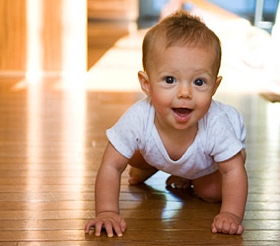Article at a Glance
Childproofing should start before you bring your baby home and continue until your children are well into their teens. Although good supervision is important, children can be fast and sometimes parents get distracted. A thoughtfully childproofed home is an essential part of keeping your children safe. And childproofing helps protect your children from a very real risk—for children 14 and under unintentional injury is the leading cause of death. And more than 30 percent of those injuries happen in the home.
The best way to childproof is to get down on your children’s level and to try to see things through their eyes. And remember that the risks will change over time as children gain more and more mobility and independence. As your children get older, take the time to explain certain hazards to them.
As you look through your home, here are some of the most common things you should watch for:
Look for exposed outlets: People often use those little plastic outlet covers, but when left out they can become choking hazards. And people have a tendency not to reinsert them after using the outlet. Instead use outlet covers with horizontal sliding doors. They don’t need to be removed and aren’t a choking hazard.
Remove Choking Hazards: Look for loose and slack electrical cords. Not only are they a choking hazard, but small children might also be tempted to pull them in and out of the outlet. Specialists also encourage parents to replace blinds with ones that are cordless. And remember that anything that can fit in a toilet paper roll can get into a child’s throat and cause them to choke. Don’t forget to take any plush toys out of the crib and crib mobiles should be removed once babies can push up onto their hands and knees.
Unsecured Furniture and TV’s: Any furniture that is taller than 30 inches should be secured to the wall. An unsecured TV can also be very dangerous. Children often reach for them and accidentally knock them over—often resulting in serious injury or even death.
Water: It only takes a few inches of water for a child to drown. Children are not always strong or coordinated enough to get out of a dangerous situation. For example, if a child falls head first into a bucket or toilet bowl, there is a very good chance she won’t be able to get out. Never leave your child unattended around water. Always supervise your child during bath time and make sure swimming pools are properly secured.
Fire: Children should not be allowed near kitchen stoves, ovens, or grills. Keep matches stored out of sight and out of reach. Install smoke and carbon monoxide detectors and be sure to regularly replace their batteries.
Poisons: Keep all cleaning products up and out of reach. Be careful where you store medications. Do not keep medications in your purse or out on the counter.
Falls: Be sure to secure stairs with a baby gate. Gates up at the top of the stairs should be screwed into the wall. Tension mounted baby gates can often be pushed over or wiggled loose. Second story windows should be secured with a window lock.
Cabinets and Doors: Cabinet locks can help keep children out of kitchen and bathroom cabinets. It is also a good idea to use childproof doorknob covers on bathroom doors and the front door.
Even when your children are older, there are a few things you will still want to be extra careful about. Keep all guns in a locked safe. Even older more responsible children might be tempted to play with them and could accidentally hurt themselves or others. Medications should also be kept locked up. With the rise of prescription drug abuse, having them locked up will give you some extra peace of mind.
Every parent should know CPR and the Heimlich maneuver. And be sure to always have important phone numbers handy for yourself, children, and babysitters in case of an emergency. (Download our Emergency Contact Sheet)
It is very important to remember that when accidents do happen to stay calm. Your children will respond to your cues. Make sure you have an emergency first aid kit and an emergency plan. A little bit of planning can help you stay clearheaded in an emergency.
